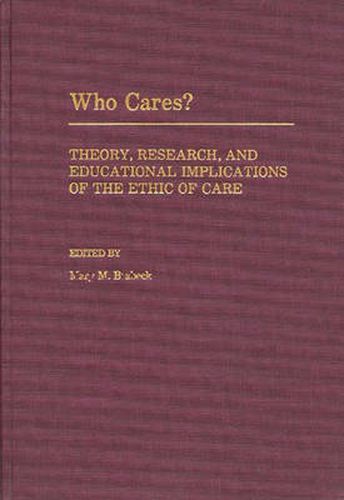Readings Newsletter
Become a Readings Member to make your shopping experience even easier.
Sign in or sign up for free!
You’re not far away from qualifying for FREE standard shipping within Australia
You’ve qualified for FREE standard shipping within Australia
The cart is loading…






In every society women have been traditionally classified as the care-giver and relationship builder. However, as we enter the future, the role of the female is changing in our society. Who Cares is an investigation, from a philosophical approach, into the ever changing views and responsibilities of women. With contributions from feminist theorists, including Carol Gilligan, Nel Noddings and Jane Roland Martin, this book challenges the view that the ethic of care is gender related. The contributors argue against the traditional view that the ethic of care belongs to the female and ethic of justice is obtained by the male. The book begins with a traditional definition of caring and a comparison of the differences in caring between the two genders. Further chapters discuss: the nature of care; the gender relatedness of care; the political and psychological price of attributing care to women; the socialization experiences that shape and develop the caring response and the caring self; the relationship between care and rationality and between care and justice; the distinction between a theory of care based on the norms of society and moral philosophy.
$9.00 standard shipping within Australia
FREE standard shipping within Australia for orders over $100.00
Express & International shipping calculated at checkout
In every society women have been traditionally classified as the care-giver and relationship builder. However, as we enter the future, the role of the female is changing in our society. Who Cares is an investigation, from a philosophical approach, into the ever changing views and responsibilities of women. With contributions from feminist theorists, including Carol Gilligan, Nel Noddings and Jane Roland Martin, this book challenges the view that the ethic of care is gender related. The contributors argue against the traditional view that the ethic of care belongs to the female and ethic of justice is obtained by the male. The book begins with a traditional definition of caring and a comparison of the differences in caring between the two genders. Further chapters discuss: the nature of care; the gender relatedness of care; the political and psychological price of attributing care to women; the socialization experiences that shape and develop the caring response and the caring self; the relationship between care and rationality and between care and justice; the distinction between a theory of care based on the norms of society and moral philosophy.